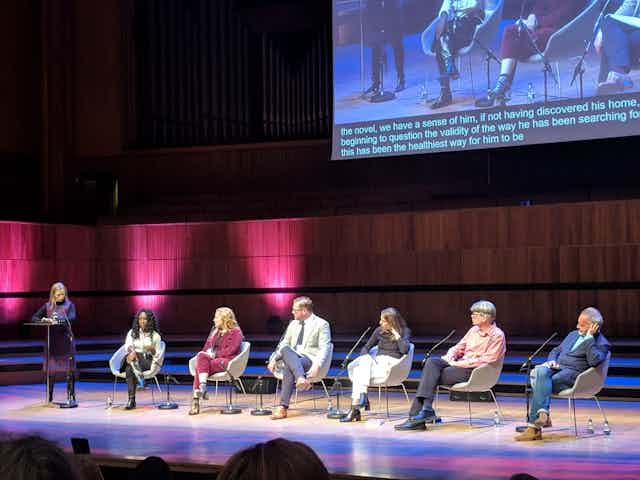Novelists are used to staring out of windows, not out at audiences. We write in solitude, and expect our readers to read in solitude. And then, for a few, the phone rings. A publicist has struck lucky with your book. It’s been shortlisted for a literary award. You can no longer be private. You have to perform live.
This year a leading independent publisher told me how he takes on a maximum of two new fiction writers a year. He knows that literary festivals and ever slimmer book review pages won’t want to hear about them. His sole hope for these books is that they win a literary prize. The big one, of course, is the Man Booker Prize.
Just one independent publisher made it to this year’s shortlist: Faber & Faber with Anna Burns’ Milkman. Faber has a kitty it can raid for the £5,000 charged to shortlisted publishers for promotional costs. And there has been plenty of promotion. As Burns admitted recently: “I can’t say anything more about my book … I’m talked out. My brain has pulled over the curtains.”
The Man Booker is something of a winner-takes-all contest. Check the current Top 20 bestsellers for original fiction and not a single shortlisted title reaches the chart. But the winner pretty much always leaps to the top. So how are the current shortlisted writers coping with this brief spell in the limelight?
First impressions
Two days before the winner was due to be announced the writers encountered each other for the first time for a Sunday night appearance at London’s Royal Festival Hall. The audience paid up to £35 a ticket to hear these writers read and talk. Take this Man Booker reading as its own performance contest, and which writer would win?

I settled in my seat with mixed expectations. In Britain, you can coax the occasional creative writing student into a soft-voiced reading, but most hate the prospect. On the other hand, writing classes in the US have spoken delivery and response at their core. In 2014, the Man Booker opened entry to US writers, so I expected the two shortlisted American writers, Rachel Kushner and Richard Powers, to leap out of the blocks.
Kushner obliged. “I recently started to wear these glasses”, she tells us, “because they’ve started to shrink all the texts in all the books.” For her excerpt from The Mars Room she pops in and out of dialogue for a tale of hotwiring a cement mixer, and laughter trills around the auditorium. Yes, she did do her own audio book, she tells the host. “I read out loud while I’m writing so I felt I’d been practising to do that.” Her big interest is in voices, their “formal syncopation – the first person is traditionally a confessional tone, a challenging voice”.
Robin Robertson’s voice is more than challenging. The Long Take is a noir novel in verse, in which a World War II veteran finds himself among the denizens of Skid Row in 1940s Los Angeles. Robertson grips hold of the perspex lectern and delivers his reading with measured threat in every line. In conversation, he tells the London audience how the book reflects the “sense of urban paranoia and panic” that gripped him on first reaching London, and the “deep sense of existential dread” felt by German filmmakers in their post-war Hollywood exile.
For Burns, her characters are nameless and appear as voices in her head. She reads in the shock of a character’s short sentences. We find ourselves shocked. We find ourselves laughing. Anna reads on. It’s tough stuff.
Esi Edugyan smiles, thanks us, tells us she’s pleased to be with us. We warm to her and recognise her nerves – but something gets stuck. The voice of the protagonist in Washington Black is of a young 19th-century boy, a slave – and his first-person past tense narrative is literary. It belongs not so much in the author’s voice, but on paper.
Richard Powers read from his novel, The Overstory, as though in awe of it, his voice close to breaking. At 502 pages, The Overstory is the longest book on the shortlist, and the five-minute reading somehow gave a sense of its length. As fellow shortlister, Daisy Johnson, noted: “There’s something treelike in the way it’s written” – and it’s true: his reading accrued detail like growth rings.
Performing arts
And so to the two “Writer in Performance” awards I took it upon myself to present for the evening. Every writer gets a special award for taking the stage yet staying true to themselves – but, for the most constant laughter and spontaneous applause, the Audience Award goes to Rachel Kushner.
I had other award categories, which Daisy Johnson nailed in reading from her Everything Under – including eye contact with audience and an urgent clarity in her reading. But ironically what clinched the Judge’s Performance Award for Daisy Johnson is the writing. She spoke as an “I” talking to a “you”. She stripped away the literary and delivered the directness of raw speech.
We all applauded, the writers walked off to sign books – and soon one Man Booker winner will be hurtled into months of celebrity. The others, surely, will step from the public gaze and return to the journey Kushner spoke of, going “deeper in myself and trying to form a rich dialogue with my own consciousness”.

